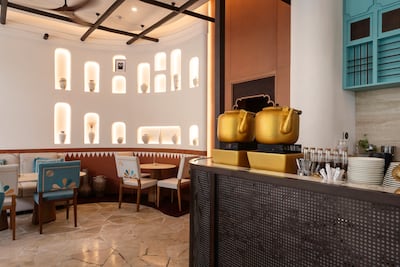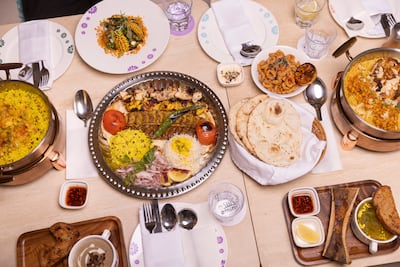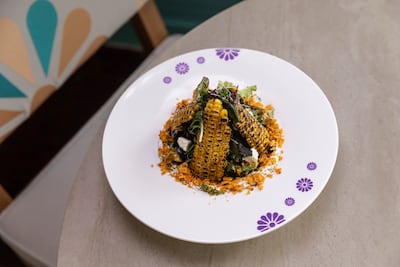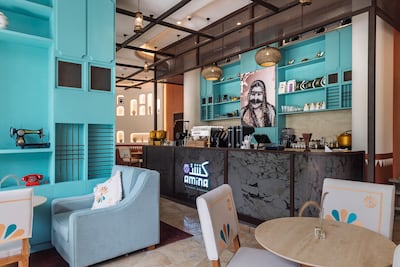It begins with a kettle. Not the tall, sleek kind that whistles in designer kitchens, but the round, sturdy bronze squat vessel with a thickened base found in many Emirati homes
“It's the same one we used in our house in Abu Dhabi,” says chef Mariam Almansoori. “Every day we used to boil the water and pour it into this big kettle with black tea with cardamom, cloves, sugar. The smell would fill the whole house.”
The kettle is now just inside the entrance of Kashtat Amina, Almansoori's newly opened restaurant in Sharjah's Aljada district, with its suburban walkways and lush greenery. There's no sign beside it. No curated description. Just the quiet suggestion that memory lives in objects as much as it does in taste.
For Almansoori, the decision to launch her first Emirati standalone restaurant – its name translates to “Amina’s picnic” after her mother – is more than a professional step. It's a homecoming. “I had a lot of chances to open a restaurant before,” she says. “But I always waited. I wanted it to be at the right time, in the right place, with the right meaning.”

That meaning comes through strongest in the food, which draws directly from Almansoori's childhood meals. Dishes such as keema hamsa (minced meat sauteed with tomatoes and onions), grilled jeder (lamb shank with tamarind sauce, basmati rice and nuts) and thareed (bread soaked in meat broth with vegetables) appear on the menu not as nostalgic flourishes, but as cultural inheritances.
“It’s not only about the food,” she says. “Lots of people come and say: ‘Chef, can we take this home with us?’ It’s just a flower on the table, or a cushion, nothing big. But to me, it’s full of love. It’s my mother’s hand in it. I still feel her, even when I’m serving strangers.”
Raised in Ras Al Khaimah, Almansoori grew up in a home with two kitchens – one run by her mother, the other often commandeered by her father – each guided by a distinct culinary philosophy that she learnt to absorb early on.
“If I ask mama how long to cook something, she never says minutes,” Almansoori says. “She says: ‘When the smell starts to change’ or: ‘When the rice starts to dance.’ That’s the kind of knowledge that stays with you.” Her father, also a skilled cook, brought a flair for presentation. “He was all about hospitality,” she adds. “He loved to garnish, while my mother didn’t. They were always arguing about that.”
Kashtat Amina carries both impulses – the quiet intimacy of home cooking and the polish of a well-run kitchen – in its expert take on rustic Emirati staples.

The restaurant, bright and lined with woven baskets, with furniture and staff in indigo, is both modern and homely – and is full of local markers, from the kettle and old transistor radio to shelves of clay jars. A painting of Almansoori’s mother Amina hangs proudly in the centre of the kitchen, her eyes warm in invitation.
One dish that carries particular weight is the chicken maragooga, a stewed chicken with vegetables and thin bread layers. “This was always loved by the family and guests,” she says. “The pot would come straight from the stove to the table and we would eat it immediately.”
That inherent sense of hospitality, so central to Emirati cuisine, is something she learnt from her mother.
“My mother used to make it when people came after the dhuhr prayer. It wasn't just food. It was the way she opened the house, welcomed people, showed care.”
Almansoori’s other ventures – including the popular Montauk in Abu Dhabi’s Yas Island, where Sri Lankan rice might be topped with slow-roasted ribs and cinnamon coconut cream served alongside Emirati majboos and an apple Danish – have long embraced reinterpretation. But this time, she wanted to move in the opposite direction. “I wanted to stop mixing. No fusion,” she says. “I wanted to go back. Bring things to their original taste. To say: this is what we had in our houses. This is how it was done.”

That backward glance, however, isn't about retreat. She speaks frequently about Emirati food as something underrepresented, not just internationally, but at home.
“If you go outside the UAE, you see restaurants from everywhere. You see Turkish, Lebanese, Japanese, but not Emirati. Even here in Sharjah or Dubai, how many restaurants are really doing Emirati cuisine? I don't mean owned by Emiratis. I mean the food.”
And she’s intent on giving those local flavours a global platform, with Almansoori hoping Kashtat Amina will be recognised if the Michelin Guide extends its UAE presence to Sharjah.
“We want to be ready, because there is a guideline that Michelin follows – from using organic produce to changing the menu regularly,” she says. “We try to update parts of the menu every three months, not just to change, but to keep enhancing and evolving. There’s a lot we still need to do, but I think we’re more than capable – because we’re doing it for the right reasons.”

That desire to teach without diluting also informs her next venture: a culinary training academy for Emiratis as well as residents. “I want to create a space where we train them from zero,” she says. “Not just how to cook, but how to work in a kitchen, how to run a restaurant.
“I already have six or seven with me now. Some of them were not confident at first, but now they are leading the service. They are managing the guests. I'm so proud.”
When asked what makes a dish truly Emirati, she doesn't hesitate. “It's not the ingredients or technique. It's when you know what each one means and why we why we use turmeric, when we add ghee, how much to stir the rice. It's not rules. It's memory.”
By the end of the visit, our own kettle of tea has gone cold. A young staff member moves to take it away, but she stops him. “Leave it,” she says quietly. “I just want to savour this moment a little more.”



